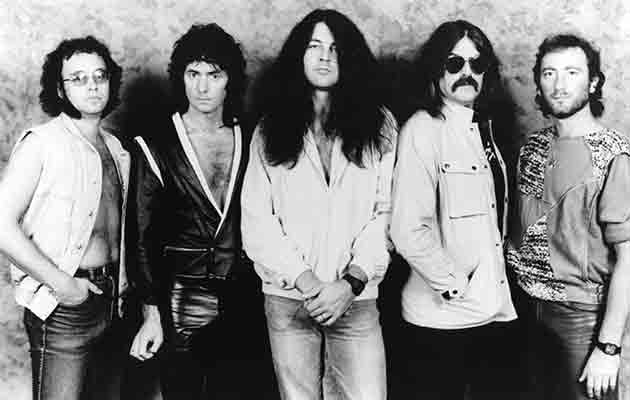MACHINE HEAD
PURPLE, 1972
“We all went down to Montreux…” Purple show their workings, as “Smoke On The Water” recounts how a rock classic was recorded in a Swiss hotel corridor. Local legend Claude Nobs assists, invaluably.
IAN PAICE: It was a comedy of errors trying to get it recorded. It wasn’t so much a question of going to Montreux as going somewhere where there was a helpful room sound. Our friend Claude Nobs said the casino in Montreux was going to be closed, and did we want to use it? We were all at the Zappa show where it burned down. My overriding memory of that concert is of Zappa telling people not to panic. At which point he chucked his guitar down and legged it.
ROGER GLOVER: We only had the Rolling Stones mobile for a certain amount of time. When the fire started, we went back to our hotel, and watched the fire from the bar. About two hours after, Claude Nobs appeared in the bar looking terribly haggard, and all he could think about was us, and what we were going to do.
IAN PAICE: We had to make it work. Like the lyrics of the song say, put the mattresses up for soundproofing – in three weeks, three days we finished writing and recording the whole album.
ROGER GLOVER: Claude helped us look around Montreux – it was hard to find a place in a sleepy town where a band can make a lot of noise at 3am. The ground floor corridor in the Grand Hotel presented the best opportunity, but we had to get a carpenter to build a couple of false walls.
IAN GILLAN: Every day we saw earthquakes, disasters, storms and crashes – that’s part of music. So when someone sets fire to the building… we’d never written a song about it. It was only in desperation, because we were short of material and desperate to get out of the place.
ROGER GLOVER: “Smoke…” was the last thing we did. We recorded a backing track at the first place Claude found – the title came to me a couple of days after the fire. I just woke up and said, “smoke on the water”. I mentioned it to Gillan and he said, “Sounds like a drug song.” We didn’t like promoting drugs in songs – we were a drinking band. We sat around listening to the backing track and one of us said, why don’t we write the story of what happened to us here? Then I said, what about “Smoke On The Water”? “Yeah, fine.” We did it line by line. It’s very literal and conversational – maybe that’s the magic of it. It amazes me that such a particular story could have such a general acceptance.
________________________
MADE IN JAPAN
EMI/PURPLE, 1972
Not just a commercially successful record, but a hard rock paradigm: the live double album. Fierce jams, from the band’s best period.
IAN GILLAN: For a rock band, I didn’t see the point in live albums. To my mind, you’ve got to be there.
IAN PAICE: Warner Bros Japan wanted to open up the Japanese market to hard rock. They said, we would like a live album for Japan – you can have it for the rest of the world. The only expense we had was Martin Birch. I think getting him over there and hotelling him cost about $3000.
ROGER GLOVER: I always felt our shows were too loose. There would be stops and starts, Ritchie would decide he wanted to do something on his own, and would make the usual signal – slice his fingers across his throat. If I hear “Lucille”… I burst out laughing. It falls into such chaos and somehow we tumble out of that.
IAN PAICE: We recorded three nights – an amalgamation of In Rock and Machine Head. When we listened to the tapes before we left Japan we thought, “This is pretty good…” But no-one could have envisaged it was going to be one of our biggest albums.
ROGER GLOVER: I couldn’t figure out why we were so successful but now I realise that we were dangerous, unpredictable. It was not cabaret. It was aggressive, loud and in your face.


